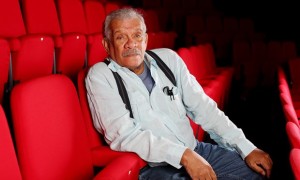 |
CaribDirect.com - The Caribbean at Your Fingertips |
|
Derek Walcott, Poet and Nobel Laureate, Dies At 87 Posted: 17 Mar 2017 08:39 AM PDT
 Walcott, who died in Saint Lucia, was famous for his monumental body of work that wove in Caribbean history, particularly his epic Omeros is pictured here in 2012. The poet and playwright Derek Walcott, who moulded the language and forms of the western canon to his own purposes for more than half a century, has died aged 87. His monumental poetry, including 1973’s verse autobiography, Another Life, and his Caribbean reimagining of The Odyssey, 1990’s Omeros, secured him an international reputation which gained him the Nobel prize in 1992. But this was matched by a theatrical career conducted mostly in the islands of his birth as a director and writer with more than 80 plays to his credit.
Born on Saint Lucia in 1930, Walcott’s ancestry wove together the major strands of Caribbean history, an inheritance he described famously in a poem from 1980’s The Star-Apple Kingdom as having “Dutch, nigger, and English in me, / and either I’m nobody, or I’m a / nation”. Both of his grandmothers were said to have been descended from slaves, but his father, who died when Walcott was only a year old, was a painter, and his mother the headmistress of a methodist school – enough to ensure that Walcott received what he called in the same poem a “sound colonial education”. He published his first collection of poems – funded by his mother – at the age of 19. A year later, in 1950, he staged his first play and went to study English literature, French and Latin at the newly established University College of the West Indies in Jamaica. After graduating in 1953 he moved to Trinidad, an island recently vacated by VS Naipaul, a contemporary of Walcott’s whose career advanced in eerie synchronicity – from early dreams of a life in literature to Nobel success. Naipaul was first to find a London publisher, Walcott first to find favour with the Swedish Academy – but their contrasting approach to the legacy of empire soured their early friendship, igniting a feud which reached its apogee when Walcott read out an attack in verse at the 2008 Calabash festival in Jamaica: “I have been bitten, I must avoid infection / Or else I’ll be as dead as Naipaul’s fiction.” Walcott continued his project to make the western canon his own, summoning up the spirits of Shakespeare, Wordsworth, Yeats and Eliot in a series of collections which explored his position “between the Greek and African pantheon”. His decision to write mostly in standard English brought attacks from the Black Power movement in the 1970s, which Walcott answered in the voice of a mulatto sea-dog in The Star-Apple Kingdom: “I have no nation now but the imagination./ After the white man, the niggers didn’t want me/ when the power swing to their side./ The first chain my hands and apologize, ‘History’ / the next said I wasn’t black enough for their pride.” His 1990 epic, Omeros, tackled the ghost of Homer head on, relocating Achilles, Helen and Philoctetes among the island fishermen of the West Indies. His plays explored the problems of Caribbean identity against the backdrop of racial and political strife. In 1977’s Remembrance, a schoolmaster finds himself split between an older generation committed to tradition and a younger one playing at revolution. Pantomime, first performed in 1978, turns the colonial order on its head, casting a black servant as explorer and his white employer as native when the story of Robinson Crusoe is staged within the play. In 2012, he told the Guardian that he felt that he was still defined as a black writer in the US and the UK. “It’s a little ridiculous. The division of black theatre and white theatre still goes on, and I don’t wish to be a part of any one of those definitions. I’m a Caribbean writer.”
We hope you enjoyed this post - Derek Walcott, Poet and Nobel Laureate, Dies At 87 and continue to follow CaribDirect.com. |
| You are subscribed to email updates from CaribDirect.com. To stop receiving these emails, you may unsubscribe now. |
Email delivery powered by Google |
| Google Inc., 1600 Amphitheatre Parkway, Mountain View, CA 94043, United States | |